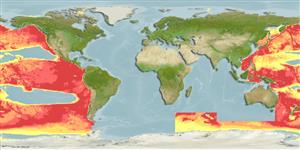Ophiura irrorata (Lyman, 1878)
| Native range | All suitable habitat | Point map | Year 2050 |

|
| This map was computer-generated and has not yet been reviewed. |
| Ophiura irrorata AquaMaps Data sources: GBIF OBIS |
Google image |
No photo available for this species.
Classification / Names आम नाम | उपशब्द | CoL | ITIS | WoRMS
Ophiuroidea | Ophiurida | Ophiuridae
Environment: milieu / climate zone / गहराई सीमा / distribution range पारिस्थितिकी
; गहराई सीमा 405 - 7199 m (संदर्भ 83942). Polar
Distribution देश | ऐफ ऐ ओ क्षेत्र | Ecosystems | संयोग | भूमिका
Indo-Pacific and Antarctic.
Length at first maturity / आकार / Weight / Age
परिपक्व अवधि: Lm ? range ? - ? cm
Life cycle and mating behavior परिपक्व अवधि | पुनरुत्पत्ति | मछलीऔ का अंडे देना | Eggs | Fecundity | Larvae
Main reference
संदर्भ | संयोजक | सहयोगीयो
Murray, J. 1896 On the deep and shallow-water marine fauna of the Kerguelen region of the Great Southern Ocean. Challenger Expedition 343-500 p. (संदर्भ 87480)
IUCN Red List Status
(संदर्भ 130435: Version 2025-1)
CITES status (संदर्भ 108899)
CMS (संदर्भ 116361)
Threat to humans
Human uses
| FishSource |
साधन
अधिक जानकारी
संघटक आहार
आहार खपत
परभक्षी
Max. ages / sizes
Length-weight rel.
Length-length rel.
Length-frequencies
Mass conversion
बहुतायत
इंटरनेट स्रोत
BHL | BOLD Systems | CISTI | DiscoverLife | FAO(Publication : search) | Fishipedia | GenBank (genome, nucleotide) | GloBI | Gomexsi | Google Books | Google Scholar | Google | PubMed | Tree of Life | Wikipedia (Go, खोज) | Zoological Record


